Rosemary oil obtained by transfer
Preparation time5 min
Waiting time30 days
Ready in30 days 5 m
Brain oil or memory oil!
Rosemary oil, also called brain oil or memory oil has many benefits from stimulating the nervous system, hair tonic, supports the circulatory system, detoxifying, good in digestive, respiratory, rheumatoid, dermatological, good for oral hygiene, ... up when purifying the air.
Servings: servings
~ 150 ml of rosemary oil
Ingredients
Estimated cost: 1.4 €
Materials
- glass container
Preparation
- Rosemary twigs are washed under a light stream of water, then shaken off the excess water and left to dry on a flat surface for ~ 10 minutes.
 We put the rosemary sprigs in the container. You can put only rosemary leaves (needles) or, even more efficiently, finely chopped rosemary leaves. I preferred to use the whole rosemary sprig, since it (rosemary) is fresh and to get a more pleasant design.
We put the rosemary sprigs in the container. You can put only rosemary leaves (needles) or, even more efficiently, finely chopped rosemary leaves. I preferred to use the whole rosemary sprig, since it (rosemary) is fresh and to get a more pleasant design. Pour the olive oil into the container, over the rosemary, until it is filled so that the rosemary is covered with oil.
Pour the olive oil into the container, over the rosemary, until it is filled so that the rosemary is covered with oil. Seal the container and leave to macerate for 3-4 weeks in a cool and airy place, away from light (closet, cellar).
Seal the container and leave to macerate for 3-4 weeks in a cool and airy place, away from light (closet, cellar).
During maceration, the nutrients in the rosemary plant will be transferred to the oil and you will notice how the oil will get a more intense color.- After maceration, we can use the oil, directly from the container or we can filter it and transfer it in small, dark bottles. If you have opted for finely chopped rosemary, it is clear, you will need to filter the oil with a sieve or gauze (after filtering, discard the rosemary residue).
In the case of whole sprigs of rosemary, they can remain in the container without any problem.
It is important that the rosemary oil obtained is kept in dark bottles, away from light, cool and airy.
Also preferred are small containers, possibly with a drip to avoid contact with air as much as possible. In prolonged contact with air, oxidation occurs and the oil will easily lose its properties.
Administration
Suggestions for use:
One tablespoon is recommended 3 times a day, on an empty stomach, possibly 30 minutes before meals.
• For hair and scalp: stimulates hair growth, fights sebum, premature whitening, removes dandruff, nourishes the scalp, gives firmness to the skin. It can be used as a daily massage and masks applied ~ 30 minutes directly on the scalp.
Regular massage of the scalp with rosemary oil, nourishes the scalp and removes dandruff. In addition, if mixed with tea tree oil and basil can treat scalp problems. Dandruff will be removed right from the first uses, rosemary being a strong anti-fungal, and dandruff is generally caused by fungi. It can also be added to shampoo or conditioner.
• For skin, beauty: anti-wrinkle, for firmness, hydration, elasticity, cellulite ... can be used directly applied to the skin, applied by massage, added to the composition of cosmetic creams, or made mask with action of ~ 30 minutes.
• For the circulatory system: improving memory, increasing concentration, stress, nervousness, migraines, depression, removing fatigue, ... In these situations aromatherapy (with vaporizer or oil baths), massage have miraculous effects.
• For the nervous system: stimulates the activity of the heart, helps clean blood vessels, regulates blood pressure. It can be consumed internally 3 times a day, on an empty stomach, 30 minutes before meals.
• For rheumatism and injuries: the anti-inflammatory effect makes rosemary oil beneficial in rheumatism: it stimulates circulation, decongests, reduces the feeling of cold hands and feet. It is also good in joint dislocations and contusions; Rosemary oil massage is ideal for such conditions.
• For respiratory ailments: due to the antiseptic / antimicrobial effect, rosemary oil clears the airways, reduces throat congestion. Aromo-terpia or inhalations are ideal.
• For dermatoses: for acne, open wounds, purulent wounds, itching, insect bites, ... local applications, 2-3 times a day are ideal.
• Oral use: mouthwash with rosemary oil, between 1-3 minutes, is beneficial to: fight oral bacteria, remove breath, prevent gingivitis, cavities and the formation of bacterial plaque.
- vaporization (diffuse, inhalations);
- aromatic bath;
- massage / friction;
- masks for skin and hair;
- in the composition of cosmetics: creams, shampoo, conditioner, ointments;
- internal as a supplement or food.
One tablespoon is recommended 3 times a day, on an empty stomach, possibly 30 minutes before meals.
• For hair and scalp: stimulates hair growth, fights sebum, premature whitening, removes dandruff, nourishes the scalp, gives firmness to the skin. It can be used as a daily massage and masks applied ~ 30 minutes directly on the scalp.
Regular massage of the scalp with rosemary oil, nourishes the scalp and removes dandruff. In addition, if mixed with tea tree oil and basil can treat scalp problems. Dandruff will be removed right from the first uses, rosemary being a strong anti-fungal, and dandruff is generally caused by fungi. It can also be added to shampoo or conditioner.
• For skin, beauty: anti-wrinkle, for firmness, hydration, elasticity, cellulite ... can be used directly applied to the skin, applied by massage, added to the composition of cosmetic creams, or made mask with action of ~ 30 minutes.
• For the circulatory system: improving memory, increasing concentration, stress, nervousness, migraines, depression, removing fatigue, ... In these situations aromatherapy (with vaporizer or oil baths), massage have miraculous effects.
• For the nervous system: stimulates the activity of the heart, helps clean blood vessels, regulates blood pressure. It can be consumed internally 3 times a day, on an empty stomach, 30 minutes before meals.
• For rheumatism and injuries: the anti-inflammatory effect makes rosemary oil beneficial in rheumatism: it stimulates circulation, decongests, reduces the feeling of cold hands and feet. It is also good in joint dislocations and contusions; Rosemary oil massage is ideal for such conditions.
• For respiratory ailments: due to the antiseptic / antimicrobial effect, rosemary oil clears the airways, reduces throat congestion. Aromo-terpia or inhalations are ideal.
• For dermatoses: for acne, open wounds, purulent wounds, itching, insect bites, ... local applications, 2-3 times a day are ideal.
• Oral use: mouthwash with rosemary oil, between 1-3 minutes, is beneficial to: fight oral bacteria, remove breath, prevent gingivitis, cavities and the formation of bacterial plaque.
Observations
⚠ Rosemary oil is renamed brain oil, memory oil or remembrance oil!
⚠ Oriental remedies associate rosemary essential oil with the chakra of the third eye, because it facilitates clear thinking and intuition.
⚠ This oil is not an essential oil. Its strength is much weaker than an essential oil, and therefore can be used as such, undiluted.
⚠ Dried rosemary can also be used to obtain rosemary oil, in which case it must be soaked for at least 4 weeks.
⚠ The use of non-metallic utensils is recommended.
⚠ Olive oil can also be used in combination with other oils: coconut oil, castor oil, argan oil, avocado oil, jojoba oil, nettle oil ... Various essential oils can also be added: : mint, tea-tree, eucalyptus, cinnamon, thyme, argan, ...
⚠ Storage and shelf life: it is recommended to store in dark glass containers, so that light does not penetrate. We also recommend storage in dark, cool and airy places (closet, cellar). Properly stored, it can be used for up to 1 year in rosemary oil.
⚠ It is recommended to keep it in small containers, and once opened, consume it in a short time (ideally in a maximum of one month), because the active elements will degrade easily, in contact with air and light (oxidation). To reduce air contact in multiple applications, you can use dark containers with applicator / drip ...
⚠ Do not store in the refrigerator as the olive oil will solidify.
⚠ Tips: Before transferring to dark bottles, it is good to add a few drops of vitamin E oil, for better preservation (if you use the oil for cosmetic purposes).
Scent: refreshing, fresh, characteristic of rosemary.
Rosemary oil is an excellent tonic for people with baldness and is also beneficial for dry and dandruff scalp.
⚠ Oriental remedies associate rosemary essential oil with the chakra of the third eye, because it facilitates clear thinking and intuition.
⚠ This oil is not an essential oil. Its strength is much weaker than an essential oil, and therefore can be used as such, undiluted.
⚠ Dried rosemary can also be used to obtain rosemary oil, in which case it must be soaked for at least 4 weeks.
⚠ The use of non-metallic utensils is recommended.
⚠ Olive oil can also be used in combination with other oils: coconut oil, castor oil, argan oil, avocado oil, jojoba oil, nettle oil ... Various essential oils can also be added: : mint, tea-tree, eucalyptus, cinnamon, thyme, argan, ...
⚠ Storage and shelf life: it is recommended to store in dark glass containers, so that light does not penetrate. We also recommend storage in dark, cool and airy places (closet, cellar). Properly stored, it can be used for up to 1 year in rosemary oil.
⚠ It is recommended to keep it in small containers, and once opened, consume it in a short time (ideally in a maximum of one month), because the active elements will degrade easily, in contact with air and light (oxidation). To reduce air contact in multiple applications, you can use dark containers with applicator / drip ...
⚠ Do not store in the refrigerator as the olive oil will solidify.
⚠ Tips: Before transferring to dark bottles, it is good to add a few drops of vitamin E oil, for better preservation (if you use the oil for cosmetic purposes).
Scent: refreshing, fresh, characteristic of rosemary.
Rosemary oil is an excellent tonic for people with baldness and is also beneficial for dry and dandruff scalp.
Effects and benefits
Hair and scalp:
- hair treatment;
- fights alopecia / prevents hair loss;
- fights sebum;
- stimulates hair follicles and helps it grow longer and stronger;
- slows down premature hair loss and bleaching;
- nourishes the scalp;
- removes dandruff;
- applied on the scalp intensifies blood circulation;
- helps to strengthen / thicken the hair;
Nervous system:
- rosemary oil protects the nervous system;
- helps to heal neuronal tissue, revitalizing brain functions;
- can prevent fainting by massaging the temples;
- reduces stress levels (lowers cortisol), aroma therapy being a good way. Cortisol is the main hormone released under stress;
- Atomotherapy with rosemary oil increases cognitive performance, alertness / degree of concentration;
- good in states of fatigue;
- restores good mood;
- improves brain / mental activity;
- improves memory;
- beneficial for patients with Alzheimer's and dementia;
- beneficial in insomnia, nervousness, anxiety, vertigo, migraines, headaches, depression, anxiety;
- drives away the hangover (the rosemary oil bath revitalizes the body);
Digestive system:
- fights digestive disorders such as: indigestion, stomach cramps, constipation, bloating, colitis;
- good in treating gastritis and gastrointestinal infections, promotes bile secretion, accelerates lazy transit, eliminates gas;
- liver tonic: helps cleanse the liver of toxins;
- promotes the secretion of bile;
- stimulates appetite / increases appetite;
- stimulates the secretions of digestive juices;
- ensures good digestion;
- accelerates intestinal transit;
- stimulates renal secretion;
Circulatory system:
- good in circulatory disorders;
- stimulates the activity of the weakened heart, good in angina pectoris;
- helps to clean blood vessels and avoid stiffening the walls of blood vessels;
- intensifies blood circulation at the peripheral and brain level due to flavonoids, thus avoiding arteritis, thrombosis, cerebral sclerosis, cold feet sensation;
- regulates blood pressure;
- helps regulate heart rate by eliminating palpitations;
- prevents coronary atherosclerosis;
Rheumatism:
- beneficial in treating rheumatism / arthritis / polyarthritis (bone diseases);
- stimulates blood circulation (massage);
- reduces the sensation of cold hands and feet;
- used in the treatment of cellulite, restores skin firmness;
- good in joint dislocations, contusions;
Respiratory disorders:
- good in respiratory diseases, due to the antiseptic effect prevents respiratory infections;
- antispasmodic action (beneficial in bronchial asthma);
- useful for colds (clears the airways, reduces throat congestion);
Dermatoses:
- dermatoses: open wounds, purulent wounds, itching, insect bites, due to the antiseptic, antimicrobial and healing effect;
- useful in eczema, oily skin, acne due to antiseptic and anti-microbial effects;
- it is ideal for acne or oily skin, restoring the firmness of the skin;
- helps in wound healing
- improves skin hydration and elasticity;
Good against oral bacteria:
- fights oral bacteria;
- removes halena;
- prevents gingivitis;
- prevents cavities and the formation of bacterial plaque;
Other:
- strengthens the immune system (even through aromatherapy);
- acts against aging processes;
- helps fight free radicals by inhalation, massage or even swallowing;
- purifies the air;
- good for skin and hair;
- relieves premenstrual pain;
- a pleasant aroma of incense and camphor;
Effects and properties:
- invigorating / tonic and relaxing effect;
- rich in antioxidants;
- antimicrobial effects;
- antiseptic effect;
- antifungal effect;
- contains significant amounts of vitamin B, A and C;
- high folate content;
- healing properties;
- detoxifying effect;
- revitalized effect;
- diuretic properties;
Side effects
- can disturb sleep if it is too concentrated and used before bed, because it is a stimulant;
- may be irritating to sensitive skin, although the concentration of this oil is low compared to an essential oil.
- rare allergies in people with allergies;
Contraindications
- Pregnant women and people suffering from high blood pressure or epileptic disorders should avoid rosemary oil.
- It is recommended to seek medical advice during pregnancy or lactation (be careful, this is not an essential oil).
- Rosemary oil can be irritating to sensitive skin. It is recommended to test it on a small section of skin dr ...
- Avoid contact with eyes and mucous membranes;
- Attention for allergic people;
Another information
- In antiquity, rosemary was considered a sacred plant by the Greeks, Romans, Egyptians and Jews.
- Its name comes from the Latin "rosmarinus", which means "sea rose" (ros: dew, mariunus: sea / sea dew), because it is found on most of the Mediterranean coast (France, Spain, Portugal, Tunisia ).
- Rosemary has a scent of incense and camphor;
- Due to its antiseptic effect, rosemary is used to preserve meat.
- Rosemary is considered an elixir of youth;
- Rosemary is the strongest cephalic oil, proving the saying "rosemary strengthens memory";
- Some parts of other plants (especially flower tips) contain phenolic antioxidants: rosemary acid, and many essential volatile oils such as: cineole, campen, borneol, bornyl acetate, alpha-pinene. These compounds are known for their anti-inflammatory, anti-allergic, anti-fungal and antiseptic properties.
The active ingredients of rosemary:
Antioxidants - flavonoids, which reduce fats and the effect of aging. Flavonoids improve circulation, especially the scalp, having healthier hair but also act on the brain, improving concentration and memory. It contains carnosol, a substance that is anti-carcinogenic and therefore is used successfully in prostate cancer, breast cancer, leukemia and colon cancer, with promising results.
Camphor - is used as an anti-inflammatory in rheumatic pains, arthritis, joint pain, even colds and flu. Camphor is also a good antiseptic.
Rosemary - this is a mild anti-inflammatory, thus helping to improve blood circulation and decongest inflammation.
- Its name comes from the Latin "rosmarinus", which means "sea rose" (ros: dew, mariunus: sea / sea dew), because it is found on most of the Mediterranean coast (France, Spain, Portugal, Tunisia ).
- Rosemary has a scent of incense and camphor;
- Due to its antiseptic effect, rosemary is used to preserve meat.
- Rosemary is considered an elixir of youth;
- Rosemary is the strongest cephalic oil, proving the saying "rosemary strengthens memory";
- Some parts of other plants (especially flower tips) contain phenolic antioxidants: rosemary acid, and many essential volatile oils such as: cineole, campen, borneol, bornyl acetate, alpha-pinene. These compounds are known for their anti-inflammatory, anti-allergic, anti-fungal and antiseptic properties.
The active ingredients of rosemary:
Antioxidants - flavonoids, which reduce fats and the effect of aging. Flavonoids improve circulation, especially the scalp, having healthier hair but also act on the brain, improving concentration and memory. It contains carnosol, a substance that is anti-carcinogenic and therefore is used successfully in prostate cancer, breast cancer, leukemia and colon cancer, with promising results.
Camphor - is used as an anti-inflammatory in rheumatic pains, arthritis, joint pain, even colds and flu. Camphor is also a good antiseptic.
Rosemary - this is a mild anti-inflammatory, thus helping to improve blood circulation and decongest inflammation.
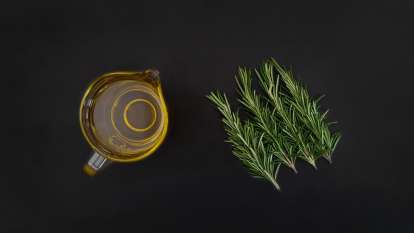

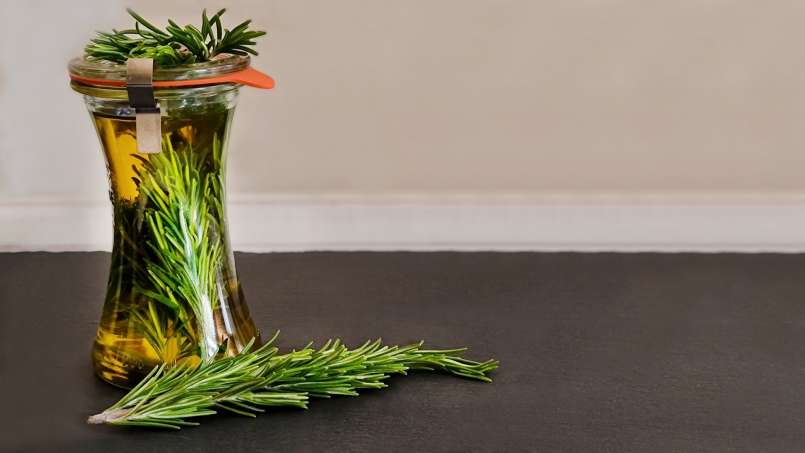
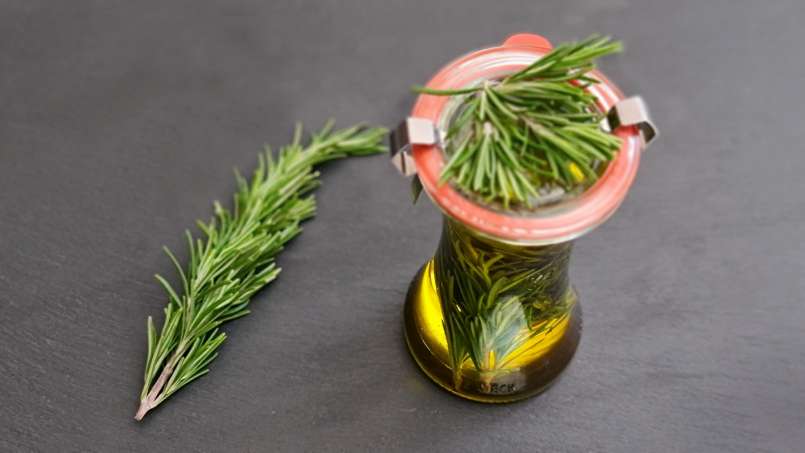
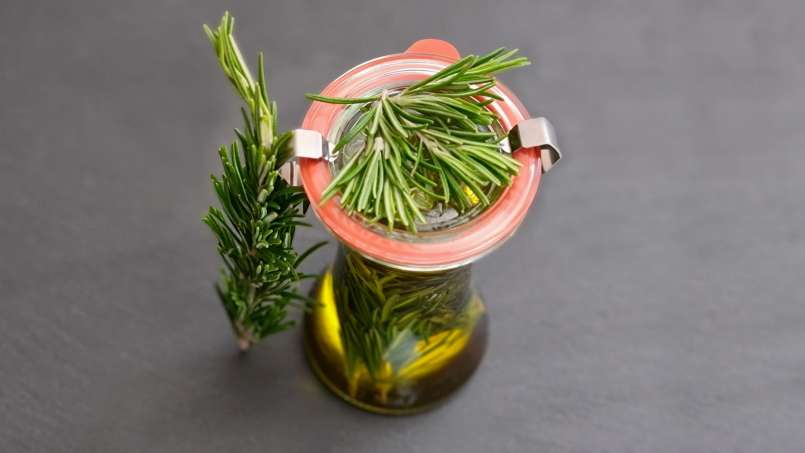
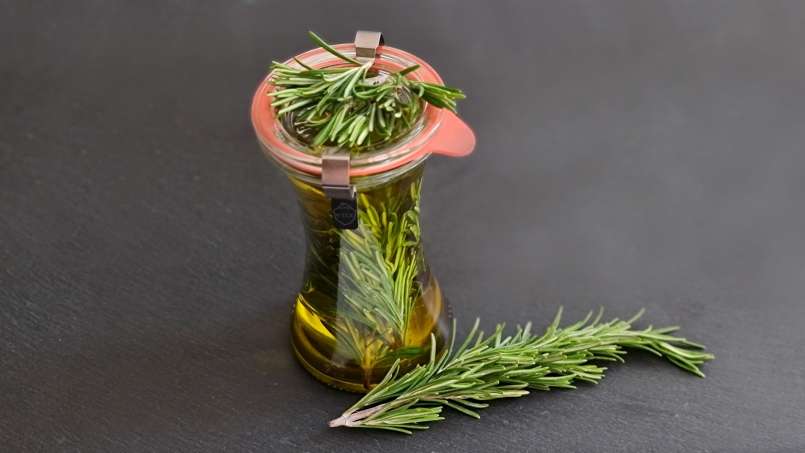
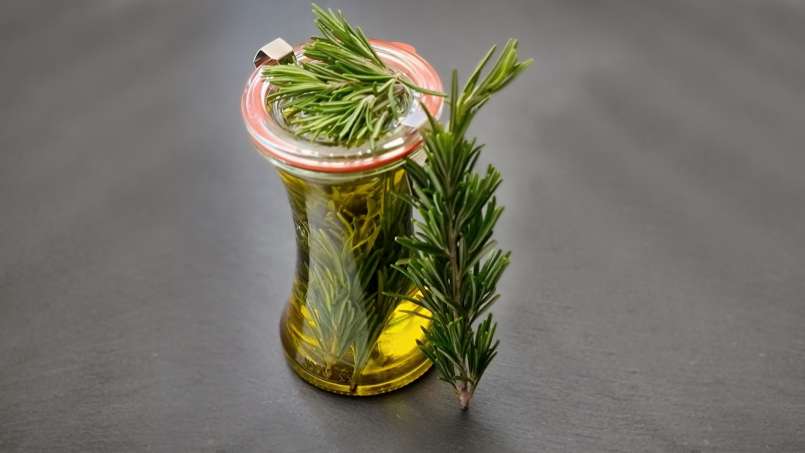
Comments